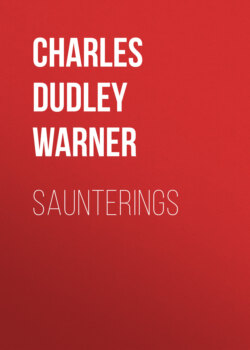Читать книгу Saunterings - Charles Dudley Warner - Страница 15
На сайте Литреса книга снята с продажи.
A GLIMPSE OF THE RHINE
ОглавлениеTable of Contents
You have seen the Rhine in pictures; you have read its legends. You know, in imagination at least, how it winds among craggy hills of splendid form, turning so abruptly as to leave you often shut in with no visible outlet from the wall of rock and forest; how the castles, some in ruins so as to be as unsightly as any old pile of rubbish, others with feudal towers and battlements, still perfect, hang on the crags, or stand sharp against the sky, or nestle by the stream or on some lonely island. You know that the Rhine has been to Germans what the Nile was to the Egyptians—a delight, and the theme of song and story. Here the Roman eagles were planted; here were the camps of Drusus; here Caesar bridged and crossed the Rhine; here, at every turn, a feudal baron, from his high castle, levied toll on the passers; and here the French found a momentary halt to their invasion of Germany at different times. You can imagine how, in a misty morning, as you leave Bonn, the Seven Mountains rise up in their veiled might, and how the Drachenfels stands in new and changing beauty as you pass it and sail away. You have been told that the Hudson is like the Rhine. Believe me, there is no resemblance; nor would there be if the Hudson were lined with castles, and Julius Caesar had crossed it every half mile. The Rhine satisfies you, and you do not recall any other river. It only disappoints you as to its “vine-clad hills.” You miss trees and a covering vegetation, and are not enamoured of the patches of green vines on wall-supported terraces, looking from the river like hills of beans or potatoes. And, if you try the Rhine wine on the steamers, you will wholly lose your faith in the vintage. We decided that the wine on our boat was manufactured in the boiler.
There is a mercenary atmosphere about hotels and steamers on the Rhine, a watering-place, show sort of feeling, that detracts very much from one's enjoyment. The old habit of the robber barons of levying toll on all who sail up and down has not been lost. It is not that one actually pays so much for sightseeing, but the charm of anything vanishes when it is made merchandise. One is almost as reluctant to buy his “views” as he is to sell his opinions. But one ought to be weeks on the Rhine before attempting to say anything about it.
One morning, at Bingen—I assure you it was not six o'clock—we took a big little rowboat, and dropped down the stream, past the Mouse Tower, where the cruel Bishop Hatto was eaten up by rats, under the shattered Castle of Ehrenfels, round the bend to the little village of Assmannshausen, on the hills back of which is grown the famous red wine of that name. On the bank walked in line a dozen peasants, men and women, in picturesque dress, towing, by a line passed from shoulder to shoulder, a boat filled with marketing for Rudesheim. We were bound up the Niederwald, the mountain opposite Bingen, whose noble crown of forest attracted us. At the landing, donkeys awaited us; and we began the ascent, a stout, good-natured German girl acting as guide and driver. Behind us, on the opposite shore, set round about with a wealth of foliage, was the Castle of Rheinstein, a fortress more pleasing in its proportions and situation than any other. Our way was through the little town which is jammed into the gorge; and as we clattered up the pavement, past the church, its heavy bell began to ring loudly for matins, the sound reverberating in the narrow way, and following us with its benediction when we were far up the hill, breathing the fresh, inspiring morning air. The top of the Niederwald is a splendid forest of trees, which no impious Frenchman has been allowed to trim, and cut into allees of arches, taking one in thought across the water to the free Adirondacks. We walked for a long time under the welcome shade, approaching the brow of the hill now and then, where some tower or hermitage is erected, for a view of the Rhine and the Nahe, the villages below, and the hills around; and then crossed the mountain, down through cherry orchards, and vine yards, walled up, with images of Christ on the cross on the angles of the walls, down through a hot road where wild flowers grew in great variety, to the quaint village of Rudesheim, with its queer streets and ancient ruins. Is it possible that we can have too many ruins? “Oh dear!” exclaimed the jung-frau as we sailed along the last day, “if there is n't another castle!”
